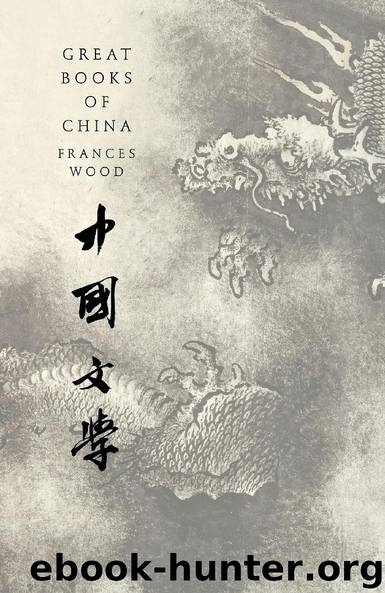Great Books of China by Frances Wood

Author:Frances Wood [Wood, Frances]
Language: eng
Format: epub
ISBN: 9781786694515
Publisher: Head of Zeus
Poems /Essays
18th century
*
YUAN MEI
1716–1798
YUAN MEI WAS HIGHLY ACCLAIMED AS A poet in his lifetime, but he was much more than just a poet. He wrote a collection of stories about the supernatural (not unlike some of those in Pu Songling’s Strange Stories from the Liao Studio [Liaozhai zhiyi ] and gave it the witty title What Confucius Did Not Say (Zi bu yu ), a hint that the contents were amusing and entertaining, rather than dry and uplifting. The stories told of ghosts who appeared in three forms — one form to scare people away, one to block their path, and one to utterly terrify them — although Yuan Mei’s heroes were able to outwit all three forms. (A student of strange behavior, he also collected court cases, based on his own experience as a magistrate.) One of his best-known works is List of Food from the Garden of Harmony ( Suiyuan shidan ). This has often been described as a ‘cookbook’ but it is more of a guide to elegant eating than a collection of recipes.
One of Yuan Mei’s great talents was the composition of funerary inscriptions, carefully composed essays full of reminiscence and praise of the departed, an art form greatly appreciated at the time. His memoir of his third sister is particularly moving: he recalled with great tenderness the games they shared as children, particularly their love of crickets and their careful burial of these little pets when they died of the cold. 1
Though his career as an official mirrors that of thousands of his contemporaries, Yuan Mei is distinguished for his wide interests, fine poetry and wit, as well as his encouragement of other poets, particularly women. A number of his granddaughters became poets. For his encouragement of young people, especially women, he was criticized; and while he was one of the most successful poets of his time (he recorded that he was once paid 1,000 silver taels for a funerary inscription), he was criticized after his death for lacking seriousness.
Yuan Mei was born in Hangzhou, beside the West Lake, into a family of modest means. His father was often away, acting as a badly-paid secretary or tutor in different parts of the country, and Yuan Mei said of his mother that ‘she did not eat vegetarian food, was not a Buddha worshipper, did not believe in yin-yang or prayers, she simply sewed and embroidered and read Tang poetry.’ Taught by his aunt and private tutors, his examination career was up and down (reflecting some of the stories in Wu Jingzi’s contemporary novel Unofficial History of the Grove of Literati [Rulin waishi ]). When only eleven, he passed the ‘boy’s examination’ (which qualified him to take the next examination), and soon after, at a very young age, he passed the first official exam (which, during the Qing, was at county level). In 1736 a special examination, the Boxue hongci (‘search for broad learning and extensive words’), was held in the capital, Beijing (the previous Boxue hongci had taken place in 1679).
Download
This site does not store any files on its server. We only index and link to content provided by other sites. Please contact the content providers to delete copyright contents if any and email us, we'll remove relevant links or contents immediately.
| African | Asian |
| Australian & Oceanian | Canadian |
| Caribbean & Latin American | European |
| Jewish | Middle Eastern |
| Russian | United States |
4 3 2 1: A Novel by Paul Auster(11050)
The handmaid's tale by Margaret Atwood(6853)
Giovanni's Room by James Baldwin(5878)
Big Magic: Creative Living Beyond Fear by Elizabeth Gilbert(4723)
Asking the Right Questions: A Guide to Critical Thinking by M. Neil Browne & Stuart M. Keeley(4576)
On Writing A Memoir of the Craft by Stephen King(4214)
Ego Is the Enemy by Ryan Holiday(3991)
Ken Follett - World without end by Ken Follett(3973)
The Body: A Guide for Occupants by Bill Bryson(3802)
Bluets by Maggie Nelson(3711)
Adulting by Kelly Williams Brown(3671)
Guilty Pleasures by Laurell K Hamilton(3587)
Eat That Frog! by Brian Tracy(3514)
White Noise - A Novel by Don DeLillo(3436)
The Poetry of Pablo Neruda by Pablo Neruda(3367)
Alive: The Story of the Andes Survivors by Piers Paul Read(3311)
The Bookshop by Penelope Fitzgerald(3228)
The Book of Joy by Dalai Lama(3218)
Fingerprints of the Gods by Graham Hancock(3213)
